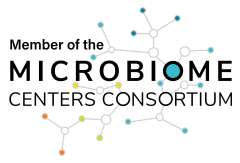About Us
The Goodman-Luskin Microbiome Center at UCLA serves as a nexus for innovative, translational, interdisciplinary research into the microbiome: the trillions of microorganisms that inhabit the human gut and have been implicated not just in gastrointestinal disorders, but in immune, metabolic, neurological, and psychiatric conditions.

Founded in 2022 with generous support from philanthropists Renee and Meyer Luskin and Andrea and Donald Goodman, the center brings together world-leaders in the microbiome field from UCLA and beyond and provides cutting-edge technology and support services in order to advance understanding of the composition and function of the microbiome and its role in many of the most pressing ailments of our time. Situated in the Vatche & Tamar Manoukian Division of Digestive Diseases, the center draws microbiome expertise across UCLA’s campus, including the David Geffen School of Medicine at UCLA, the UCLA College of Life Sciences, the UCLA Samueli School of Engineering, and the UCLA Department of Computational Medicine. Ultimately, the center team is inspired by the promise of life-changing applications in disease prevention, diagnosis, and treatment.
“We hope the research being conducted will translate into improving patient care and quality of life,” says Eric Esrailian, MD, MPH, chief of the division.
The center encompasses research programs in eight focus areas that highlight UCLA’s expertise in microbiome-gut-brain research, among other interdisciplinary areas: inflammatory bowel diseases, substance use disorders, eating behavior, metabolism and obesity, neurodevelopmental and neurodegenerative diseases, disorders of gut-brain interaction, cardiovascular and lipid disorders, liver disease, and mental illness and chronic pain.
A wide range of services, including seven technical cores: clinical studies and database, neuroimaging, integrative bioinformatics and biostatistics, microbiome sequencing, biorepository, human probiotic, and gnotobiotics, as well as an administrative support core, support the center’s research programs. “These cores provide a whole menu of services that people can use,” says the center’s founding director Emeran A. Mayer, MD.
“A focus on integrated systems,” says the center’s co-director Arpana Church, PhD, “emphasizes interplay between the microbiome, other systems and the environment.”

“Collaboration is a foundation of the Goodman-Luskin Microbiome Center, and the center fosters crosstalk between researchers and clinicians from a variety of disciplines,” says co-director Jonathan P. Jacobs, MD, PhD. Each member brings “unique expertise, perspectives, and collegial spirit,” adds Elaine Y. Hsiao, PhD, the center’s director.
Center members are encouraged to explore partnerships with other UCLA programs such as gastroenterology, urology, neurology, and psychiatry, and with other institutions, government, and industry.
“To nurture a new generation of star microbiome researchers, center members offer specialized training to fellows in the Vatche & Tamar Manoukian Division of Digestive Diseases,” says the division’s vice chief and director of UCLA’s GI Fellowship Program, Lin Chang, MD.
The center also offers a Pilot and Feasibility Program to facilitate translational projects, with funding provided in the form of vouchers for use of the center’s core services, a postdoctoral fellowship, and seed fellowship funding.